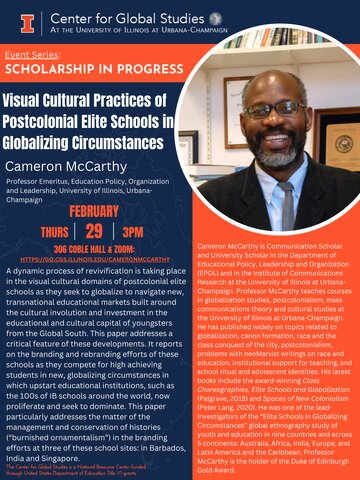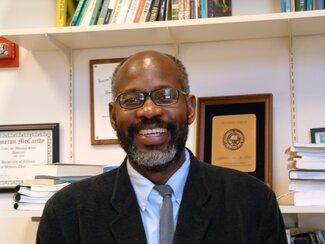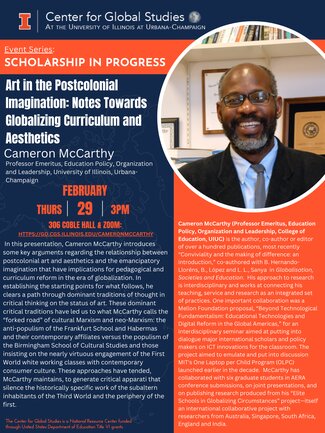
A recording of Professor McCarthy's talk is available at the end of this description.
Thursday, February 29th | 3-4pm | 306 Coble Hall and Zoom
A dynamic process of revivification is taking place in the visual cultural domains of postcolonial elite schools as they seek to globalize to navigate new, transnational educational markets built around the cultural involution and investment in the educational and cultural capital of youngsters from the Global South. This paper addresses a critical feature of these developments. It reports on the branding and rebranding efforts of these schools as they compete for high achieving students in new, globalizing circumstances in which upstart educational institutions, such as the 100s of IB schools around the world, now proliferate and seek to dominate. This paper particularly addresses the matter of the management and conservation of histories (“burnished ornamentalism”) in the branding efforts at three of these school sites: in Barbados, India and Singapore respectively. These schools form part of a 5-year, 9-country study of postcolonial elite schools in globalizing circumstances—a flash point of articulation between these schools and profound change. This essay turns on this fundamental fact: that these schools, which are the products of societies marked historically by colonial and imperial encounters, are now driven forward by new energies associated with marketization, neoliberalism and globalization as these countries lurch forward unevenly towards a postdevelopmental era. This turn towards neoliberal globalization has precipitated radically new needs, interests, desires, capacities and competitive logics among the middle class and upwardly-mobile young and their parents in each of these societies that then press powerfully onto these elite schools and they cultivated pasts as they reside paradoxically in the dead objects bequeathed from the colonial past: buildings, monuments, statues, photographs, school anthems, flags, emblems, crests, bunting, banners, rituals of assembly, formal dress and decorum. All of this is taking place in the glow of digitalization as these schools increasingly move online locating themselves in photo and video-sharing websites such as YouTube, Facebook, Instagram and Flickr as well as websites that each individual school is creating to consecrate school heritage.
Professor Cameron McCarthy Cameron McCarthy is Communication Scholar and University Scholar in the Department of Educational Policy, Leadership and Organization (EPOL) and in the Institute of Communications Research at the University of Illinois at Urbana-Champaign. Professor McCarthy teaches courses in globalization studies, postcolonialism, mass communications theory and cultural studies at the University of Illinois at Urbana-Champaign. He has published widely on topics related to globalization, canon formation, race and the class conquest of the city, postcolonialism, problems with neo-Marxist writings on race and education, institutional support for teaching, and school ritual and adolescent identities in journals such as Harvard Educational Review, Oxford Review of Education, Studies in Linguistic Sciences, The British Journal of the Sociology of Education, The European Journal of Cultural Studies and Education, Contemporary Sociology, Communications Inquiry, Cultural Studies, Discourse among many others. He is the author or co-author of several books including: Reading and Teaching the Postcolonial: From Baldwin to Basquiat and Beyond (Columbia University, TC Press, 2001), Foucault, Cultural Studies and Governmentality (SUNY Press, 2003) The Uses of Culture: Education and the Limits of Ethnic Affiliation (Routledge, 1998), Globalizing Cultural Studies: Ethnographic Interventions in Theory, Method and Policy (Peter Lang, 2007), and Transnational Perspectives on Culture, Policy, and Education: Redirecting Cultural Studies in Neoliberal Times (Peter Lang, 2008) and New Times: Making Sense of Critical/Cultural Theory in a Digital Age (Peter Lang, 2011), Mobile Identities, Mobile Subjects: Knowledge and Cultural Transformation in the Global Age (Common Ground, 2014), Elite Schools in Globalizing Circumstances (Routledge. 2016)His latest books include the award winning Class Choreographies, Elite Schools and Globalization (Palgrave, 2018) and Spaces of New Colonialism (Peter Lang, 2020). He was one of the lead-investigators of the “Elite Schools in Globalizing Circumstances” global ethnography study of youth and education in nine countries and across 5 continents: Australia, Africa, India, Europe, and Latin America and the Caribbean. Professor McCarthy is the holder of the Duke of Edinburgh Gold Award.
Recording:
(Please note that there were technical challenges with this Zoom recording, so the video itself begins a little late)

